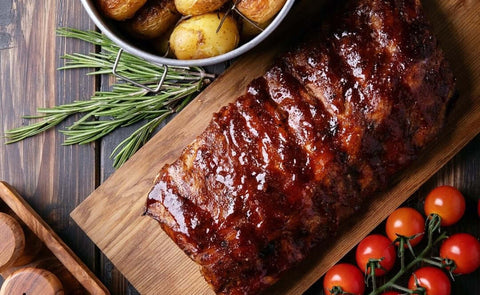At KC Cattle Company, we talk a lot about flavor, marbling, and the legacy behind our Wagyu beef. But what about nutritional benefits? Whether you're chasing macros, trying to build lean muscle, or just want to make smarter choices at the butcher counter, not all steaks are created equal.
In this post, we break down the best and worst cuts of steak based on nutritional value, using verified nutritional data, scientific insights, and a few steak secrets the industry doesn’t often talk about.
What Makes a Steak "Nutritious"?
When we talk about steak nutrition facts, we’re usually referring to:
Protein content per serving
Fat content, particularly saturated vs. unsaturated
Micronutrients, like iron, zinc, and B vitamins
Calorie density
But there’s another factor many overlook: bioavailability. This is how well your body can absorb and utilize the nutrients in beef. Grass-fed and Wagyu beef tend to offer a better Omega-3:Omega-6 profile, making them more heart-friendly than conventional beef (source).
Top 5 Lean & Nutritious Cuts of Beef

1. Eye of Round
- Calories: ~140 per 3 oz
- Fat: 4g
- Protein: 24g
- Why It’s Good: This ultra-lean cut from the round primal has one of the best protein-to-fat ratios in the butcher shop. Great for those watching calories without sacrificing protein. USDA source
2. Sirloin Tip Side Steak
- Calories: ~160 per 3 oz
- Fat: 5g
- Protein: 23g
- Why It’s Good: Another lean powerhouse, it offers high zinc and selenium content for immune function. Plus, it’s budget-friendly.
3. Top Sirloin
- Calories: ~160 per 3 oz
- Fat: 6g
- Protein: 22g
- Why It’s Good: Higher in creatine and B12, which is excellent for energy metabolism and brain health (source).
4. Bottom Round Steak
- Calories: ~150 per 3 oz
- Fat: 4.5g
- Protein: 24g
- Why It’s Good: Slightly tougher, but packed with protein and one of the lowest-fat options available.
5. KC Cattle Company’s Cuts
Why It’s Good: Our BMS 4-7 Wagyu Ribeyes and Filets offer rich marbling, but thanks to the unique fat composition of Wagyu (higher in monounsaturated fats like oleic acid), they’ve been shown to have a more favorable impact on cholesterol than conventional grain-finished beef (source).
The 3 Least Nutritious Cuts - Steak Nutrition Facts

1. Ribeye Cap (Spinalis Dorsi)
Calories: ~230+ per 3 oz
Fat: 18-20g
Protein: 20g
Why It’s On the List: Delicious? Yes. Nutrient-dense? Absolutely. But if you’re watching saturated fat or caloric intake, this luxurious cut should be a treat, not a staple.
2. T-Bone/Porterhouse (Tenderloin Side)
Calories: ~210 per 3 oz
Fat: 16g
Protein: 22g
Why It’s On the List: The bone-in cuts are visually impressive but often contain more intermuscular fat than you’d expect.
3. Short Ribs
Calories: ~230+ per 3 oz
Fat: 20g+
Protein: 19g
Why It’s On the List: Rich in collagen and flavor, but very high in fat. Best saved for special occasions or post-leg-day indulgence.
Steak Nutrition Facts FAQ
What is the leanest cut of steak?
The leanest widely available cut is the Eye of Round , which has high protein content and minimal fat. According to the USDA, a 3.5 oz cooked portion has about 170 calories, 28g of protein, and only 4g of fat.
Which steak cut has the most protein?
Lean cuts like Sirloin Tip Side Steak and Flank Steak often offer over 23g of protein per 3.5 oz serving. Eye of Round is also a strong contender for the most protein per calorie.
Is Wagyu beef healthy?
Yes—in moderation. Wagyu beef is higher in monounsaturated fats, particularly oleic acid, which may support heart health. It’s richer than conventional beef, so smaller portions go a long way. Learn more in this research article on Wagyu’s fat composition .
What’s the difference between Prime, Choice, and Wagyu?
USDA Prime and Choice refer to grading based on marbling and maturity. Wagyu uses a Japanese BMS (Beef Marbling Score) scale that goes far beyond USDA Prime in richness and fat distribution. Here’s a deeper look at beef grading systems .
What is the healthiest way to cook steak?
Grilling, broiling, or pan-searing without excess oil are top choices. Avoid deep frying or heavy butter sauces if you're watching fat intake. Use simple seasonings like KC Cattle Company’s Wagyu Steak Seasoning for flavor without the extra calories.
Do fattier steaks like Ribeye still have nutritional value?
Absolutely. While Ribeye is higher in calories and fat, it’s also rich in iron, zinc, and B vitamins. It’s all about portion control—balance indulgent cuts with leaner meals throughout the week.
Final Thoughts from the Ranch about Steak Nutrition Facts
We believe beef should be enjoyed without guilt—but if you’re trying to make more informed choices, knowing the difference between a Bottom Round and a Ribeye Cap matters. Nutritional choices don’t have to mean sacrificing flavor. When sourced with care—like our pasture-raised, non-GMO-fed Wagyu—you get superior taste and smart nutrition in one.
Sources Cited About Steak Nutrition Facts:
Steak Nutrition Facts: The Best & Worst Cuts
Top nutritional pick: Eye of Round – lean, protein-packed, and low in fat.
Best balance of fat and flavor: Sirloin Tip Side Steak and Flank Steak offer solid protein with moderate fat.
Fan favorites that surprise: Chuck Eye and Denver Steak combine great flavor with decent nutrition when portioned wisely.
Cuts to limit (not eliminate): Ribeye and T-Bone bring the marbling, but also higher saturated fat and calories.
Wagyu Beef provides higher oleic acid levels (the good fat!) compared to conventional beef, contributing to its unique health profile.
Backed by science: This post includes citations from Mayo Clinic and peer-reviewed nutritional journals.
KC Cattle Company Wagyu Beef is pasture-raised and full of flavor without compromising quality nutrition.








Comments (0)
There are no comments for this article. Be the first one to leave a message!